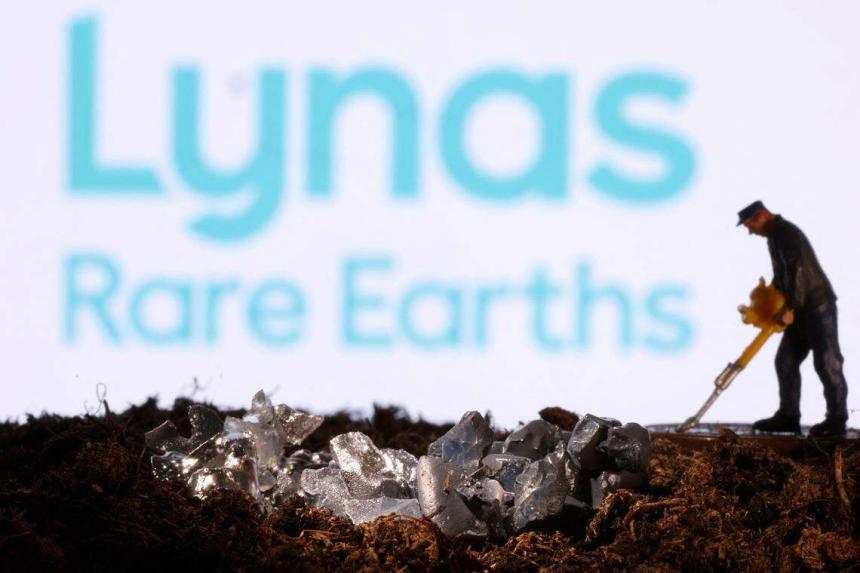KUALA LUMPUR – Malaysia has extended to January 2024 a deadline for Australian miner Lynas to ensure its rare earths plant in Pahang, the world’s largest, is effectively radiation-free.
The Straits Times has learnt that the six-month delay, following an April 28 appeal hearing, was conveyed to Lynas late on Friday ahead of an expected announcement this week.
The decision, legally under the sole discretion of Science, Technology and Innovation Minister Chang Lih Kang, is closely watched due to the geopolitical importance of rare earths.
China controls four-fifths of the global production of the minerals crucial to high-technology applications such as smartphones, electric vehicles and military assets.
The authorities issued a three-year licence renewal to Lynas in February but refused to remove conditions effective from July 1.
The main requirement is the need to move “cracking and leaching” of lanthanide concentrate to another site outside of Malaysia, and refine only intermediate materials at its facility in Gebeng, near Kuantan in Pahang.
The refining processes have sparked fears of environmental and health hazards, especially the release of radiation that Lynas insists has no impact on the normally occurring levels around Gebeng.
Opposition Perikatan Nasional (PN) as well as industry and diplomatic officials have lobbied Mr Chang to revise the conditions to ensure Lynas would not have to shut down its Malaysian operations, which account for half of the world’s rare earth supply outside of China.
Lawmakers from PN said the facility in Pahang can be a source of technology transfer so that Malaysia can be a player in the crucial industry for cutting-edge applications.
In its quarterly report in April, Lynas said if its licensing conditions remain unchanged, it would have to temporarily close its Malaysian plant in mid-July.
The three months after that will see little or no production before it ramps up, depending on how an alternative cracking and leaching refinery in Australia progresses.
“The six-month deferment will now allow Lynas a seamless transition. It’s a win-win compromise,” a source told ST.
ST reported in April that in addition to Lynas’ request for the licensing conditions to be dropped completely, Western diplomats had asked the Malaysian government for another half a year for the Australian refinery to get up and running.
Lynas is among several high-profile issues that have forced the Pakatan Harapan (PH)-led government to soft pedal on its previous statements.
This includes its decision last Wednesday allowing Swedish telecommunications firm Ericsson to continue a nationwide roll-out of Malaysia’s 5G network despite previous claims of abuses in how previous governments handed out contracts for the new mobile technology. This comes amid widespread speculation that Chinese rival Huawei could be brought in as a competitor.
Prime Minister Anwar Ibrahim’s PH coalition previously campaigned in the 2013 and 2018 general elections to shut down the Lynas plant, which was established under the Barisan Nasional (BN) government over a decade ago.
BN, led by former ruling party Umno, is now a key ally in his unity government after the 2022 general election resulted in Malaysia’s first hung Parliament.
Lynas faced stiff public resistance when it first made plans to set up in Malaysia, sparking fears that there would be a repeat of toxic radiation that previous rare earth projects had caused in Malaysia.
However, after PH took power in 2018, it allowed Lynas to continue operations on progressively more lenient terms.
This raised public ire and contributed to growing tensions within the then Tun Dr Mahathir Mohamad-led administration.
The PH government eventually collapsed in March 2020, after dozens of MPs defected.
In February 2020, just days before PH was ousted as a result of defections, it was announced that the government had given Lynas a three-year permit to operate, on the condition that cracking and leaching would be moved out of Malaysia, and a permanent waste disposal site developed within a year.
Following Mr Chang’s decision on Friday, the disposal site must now be ready by Jan 1, 2024, and will house waste from the Gebeng plant produced up to the end of 2023.
ST understands that the permanent disposal facility – being built by a company controlled by Pahang Regent Hassanal Abdullah, the son of Malaysia’s current King Abdullah Ahmad Shah – is about a third complete.


